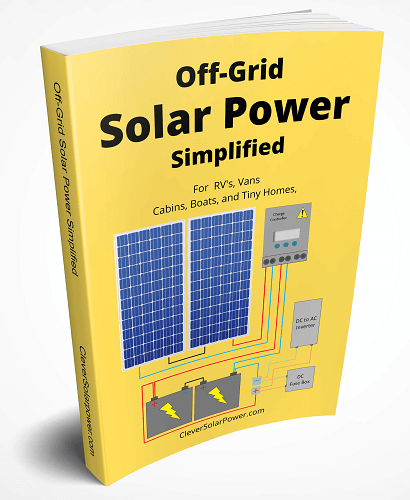With solar panels becoming increasingly affordable, it’s natural to think about solar panels as an alternative to run your air conditioners. That’s the reason you’re here.
The idea of powering your ACs with sunlight is altogether genius. But how many solar panels can run an air conditioner?
Well, that’s the million-dollar question.
But don’t worry, we have done some serious calculations. Read on!
Grid-Tied and Off-Grid Solar Power
If you’re thinking about going all-solar, consider this:
- The solar panels (no matter how many you have) will generate energy in the daylight.
- After the sunset, you rely on the stored power to keep things moving.
At present, there are mainly two types, grid-tied and off-grid.
Off-grid system
When people talk about going off-grid, nine out of ten times, they want to get rid of their utility company.
They want to stop paying them money and generate their own electricity. In some countries, you can even sell the energy generated.
These storage systems give you peace of mind in places where power grids are not reliable.
Grid-tied system
A grid-tied system is a bit different. In fact, it’s more in demand because of reliability. The higher efficiency rates of the system appeal more to the homeowners.
When the solar panels generate more electricity than needed, with net metering it can either be stored into batteries or transferred to the utility grid, or the power distribution system.
You can deposit as much power in the grid as you want, and many utility companies buy electricity at fair prices from homeowners.
In case of battery failure in your solar panel system, you can always go back to the grid easily.
Solar Panels to Run Air Conditioning
Now that you know bits’ n pieces about power systems, you can figure out yours. The next step is to see how solar panels can power air conditioning.
Get this: Air conditioners suck up a lot of electricity
It’s not easy to estimate how much power an AC consumes as it depends on various factors, such as model, location, weather, and so on.
Anyhow, we’ll help you simplify the problem.
Power Consumption: AC vs. Solar Panel System
A one-ton AC consumes up to 1.3kWh. In comparison, a normal solar panel system produces 2kW to 4kW of power, on average. That means, it’ll consume almost half of the energy the solar panel system generates.
Since Air Conditioning units come in different sizes, their energy consumption varies.
An average single room air conditioner will consume approximately 0.5kW to 1.5kW, while a central AC may consume between 3kW to 5kW. So you’re going to need at least 3kW of energy from your solar energy system for single room AC, which will also cover the energy requirements of other appliances and fixtures.
Number of Solar Panels
If a single solar panel produces approximately 300 watts or more, you need about ten panels to take care of your energy needs. Also, there should be an equally powerful inverter to handle the load.
How Long Can You Run Your AC on Solar Power?
In our case, the air conditioner can run for about 4 to 5 hours, which is also an average run time for AC. As we mentioned this is just a rough estimate, things could be different for you depending on the weather conditions, location of the solar panel, and the overall condition of your AC unit.
If you want to run your AC for a longer period, go for a system with a higher capacity – around 3-4kW.
The power required by the AC will be provided by the solar battery bank – a number of solar batteries tied together.
These batteries will cost as much as 40% of the entire cost of the solar energy system. That’s why solar panel systems are quite expensive.
Solar Power Usage
If you know how solar panels work, you can work out the area they will occupy. As solar panels depend upon sunlight to produce electricity, the more area they cover, the better it will be to meet your energy requirements.
But this is not as easy as you might think.
The energy output of the panels depends on the geographical location, placement of the panels, their type, electric connection, model, etc.
Each solar panel needs sufficient space to get the maximum exposure to sunlight. Also, add the amount of space the wiring will occupy.
Let’s go back to the 3kW solar panel model we mentioned above.
The entire system will have to be nearly 225 sq.ft. or take up the area of 15ft×15ft. It may sound like a large area at first, but the panels will fit almost all average-sized rooftops.
The output of the whole system will largely depend on its placement. However, the ideal output of each solar panel should be about 345W.
It means that each panel in this system will give you an average output of 20W per sq.ft. If that’s the case, by the end of the year, the solar panel system will give you a total output of 121kwh per sq. ft.
Plus, the panels work more efficiently if you position them at an angle of 32 degrees, South. Find out your ideal solar panel tilt angle here.
Final Thoughts
It’s a smart idea to power your appliances and air conditioning unit with solar energy. It not only cuts down your monthly utility expenses but also serves as a long-term investment for your air conditioning unit.
Besides, solar panels don’t pollute the environment while producing electricity. They are a clean source of power. A one-time upfront cost of the solar panel will free you from future expenses too.
Although we recommend grid-tied systems, off-grid systems can cover your air conditioning usage as well, provided you have the capital and space.
 I have written a book that contains all the information you need to get started with off-grid solar power.
I have written a book that contains all the information you need to get started with off-grid solar power.
With over 1,300 reviews at 4.5 stars, I can almost guarantee you that this book will save you $100’s on buying the right equipment.
You can buy it here on Amazon.com

I’m an off-grid enthusiast. I created this website to give clear and straight-to-the-point advice about solar power. I’m also the author of the book ‘Off-grid solar power simplified‘. Read more about me on my about page, check out my Youtube channel, or send me a message.
If I was using 12v100ah deepcyle seals led AGMs. How many would I need for the 3k system? It’s no Large AC unit. Just trying to take care for future applications?
Hello Julio, I don’t understand your question. Do you mean 3,000 watts of solar or a 3kw inverter?
Dear Nick; You should also write something about that some controllers charge with light all day, lets say 20% of stated solar connected power. I have that experience in a off-grid system. One controller is cheaper and another double price (EpeverXtra) all MPPT. The expensive one charge from sunrise to sunset, while the almost only when sun is shining. I get from two panels (800 W) 100-200 w, typical 150 W.
I also have an question. Should I connect the controller load output to inverter instead of having the inverter directly connected to battery bank?
Hello Per,
I don’t understand your statement about ‘some controllers charge with light all day’. If you mean without sunlight, then yes. But why would you put the panels in the shade? This only happens during sunrise and sunset. That’s why series connections are preferred. Do you mean a price difference between Epever and the EpeverXtra? I don’t see a higher price difference between the two. Make sure you select the same current.
Hi Nick again! I think I explained bad. What I am meaning is when is cloudy. With a good controller, you get some charge all day between sunrise and sunset. Not all controller do that. First I bought a cheap MPPT Junge which didn’t do that, but with the new Epever Xtra controller, I get 100-150 W or about 20% charge all day when its not sunny. This is a lot of energy enough for a big refrigerator or other. This is an of grid system and all energy I can get out of the system is important.
My question, should I connect the controller directly to the inverter? Most ‘experts’ do not recommend that. But if I could connect, I will see how energy is used per day.